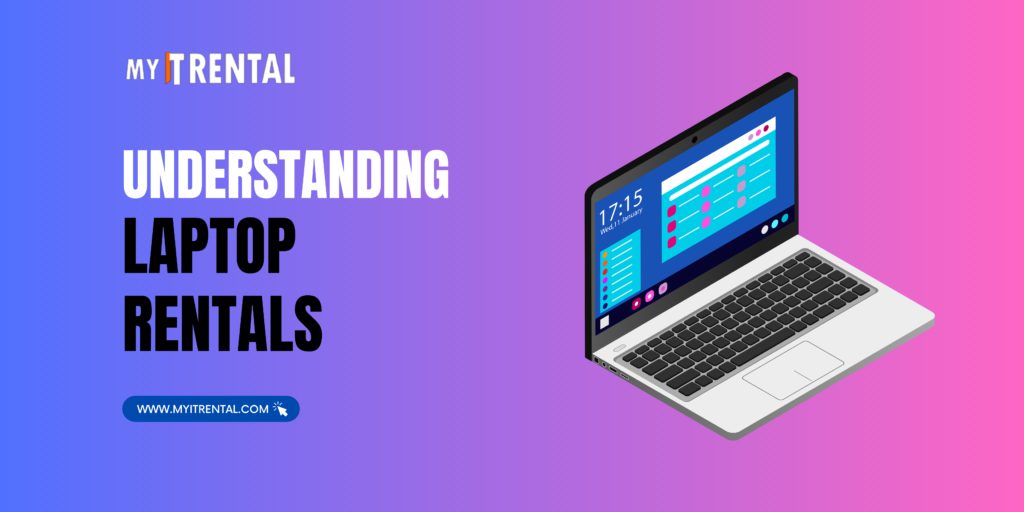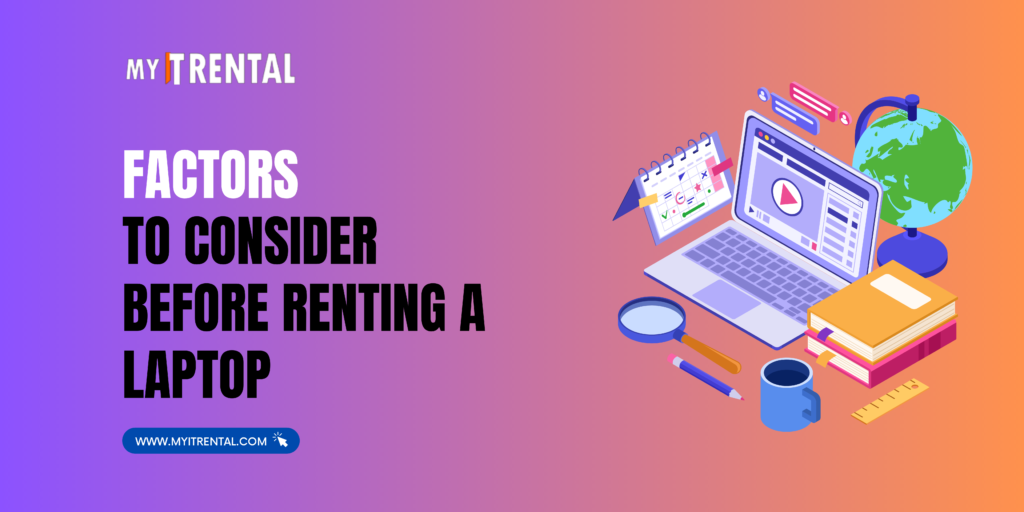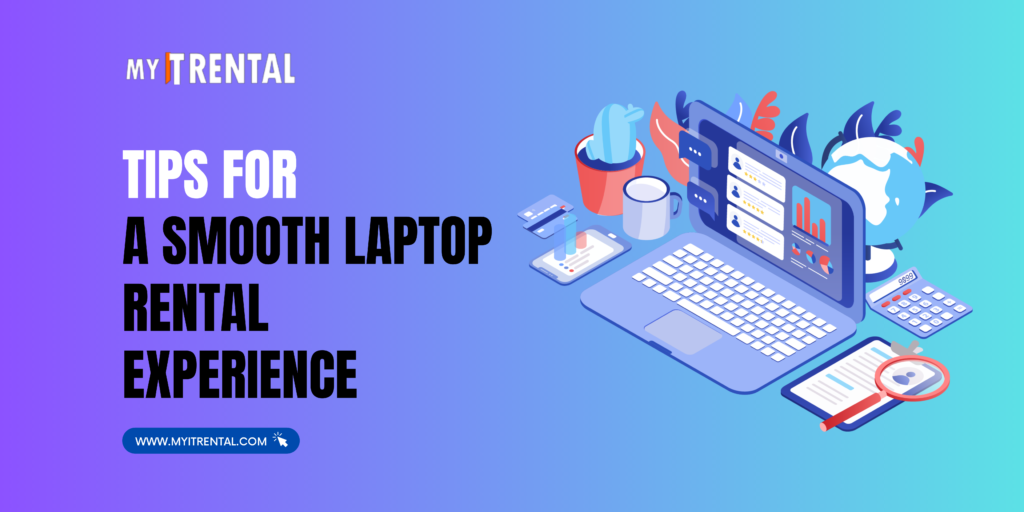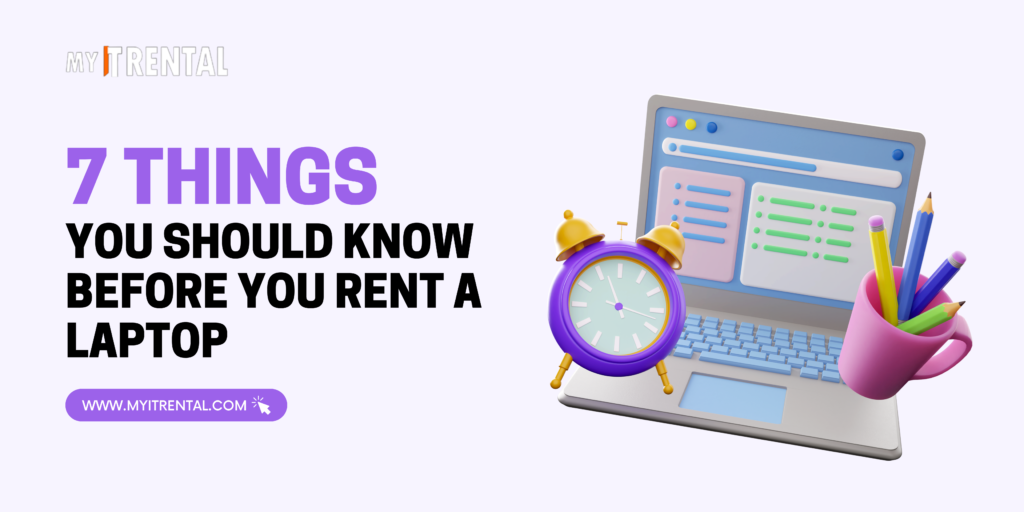Renting a laptop can be a convenient and cost-effective solution for various situations, whether you need temporary access to a computer for work, travel, or personal use. However, before you dive into the world of laptop rentals, it’s essential to understand the key factors and considerations involved. In this comprehensive guide, we will explore everything you need to know before you rent a laptop, ensuring you make an informed decision that aligns with your needs and preferences.
1. Understanding Laptop Rentals

Laptop rentals refer to the process of temporarily leasing a laptop computer from a rental service provider for a specified period. These services cater to a wide range of individuals, including business professionals, students, travellers, and event organizers. Laptop rental companies offer flexible plans to accommodate various needs, whether it’s a short-term rental for a few days or a long-term rental spanning several months.
2. Benefits of Renting a Laptop
Renting a laptop presents several advantages that make it an attractive option for many users. Some key benefits include:
- Cost-Effective Solution: Renting a laptop allows you to access the latest technology without the hefty upfront costs associated with purchasing a brand-new device.
- Flexibility and Convenience: Laptop rentals provide the flexibility to choose the specific model and configuration that suits your requirements. It’s a convenient solution for temporary needs or when you don’t want to commit to a long-term investment.
- Technical Support: Rental providers often offer technical support and maintenance services, ensuring that you receive prompt assistance in case of any issues or concerns.
- Try Before You Buy: Renting a laptop gives you the opportunity to test a particular model or brand before making a purchasing decision. This can help you determine if the laptop meets your expectations and fulfils your requirements.
3. Factors to Consider Before Renting a Laptop

Before renting a laptop, it’s crucial to consider several factors to ensure you choose the right rental service and laptop that aligns with your needs. Let’s explore these factors in detail:
Laptop Specifications
When selecting a rental laptop, carefully evaluate its specifications to ensure it meets your requirements. Consider the following aspects:
- Processing Power: The processor’s speed and capabilities are crucial for tasks such as gaming, graphic design, and video editing. Choose a laptop with a processor that can handle your intended usage.
- RAM and Storage: Adequate RAM and storage capacity are essential for smooth multitasking and storing your files, respectively. Assess your needs and opt for a laptop with sufficient memory and storage.
- Display Size and Resolution: Consider the display size and resolution depending on your preferences and the nature of your work or activities. Larger screens are beneficial for tasks requiring detailed visuals, while smaller screens offer greater portability.
- Battery Life: If you require extended usage without access to a power source, prioritize laptops with long battery life.
- Connectivity Options: Evaluate the available ports (USB, HDMI, etc.) to ensure compatibility with your peripheral devices and connectivity requirements.
Rental Terms and Conditions
Before finalizing a laptop rental, carefully review the terms and conditions provided by the rental service. Pay attention to the following:
- Rental Duration: Determine how long you need the laptop and ensure the rental period aligns with your requirements.
- Fees and Charges: Understand the rental fees, security deposits, late return charges, and any additional costs associated with the rental. Clarify if there are any hidden charges to avoid surprises.
- Insurance Coverage: Inquire about insurance options to protect yourself from potential damages or theft during the rental period.
- Return Conditions: Familiarize yourself with the return process, including the condition the laptop should be in upon return. Make note of any potential penalties for damage or loss.
Rental Providers
Research different laptop rental providers to find a reputable and reliable service. Consider the following factors when evaluating providers:
- Reputation and Reviews: Look for customer reviews and testimonials to gauge the quality of service provided by the rental company.
- Availability and Selection: Ensure the rental service offers a diverse range of laptop models and configurations to choose from.
- Delivery and Pickup Options: Check if the provider offers delivery and pickup services at your preferred location, saving you time and effort.
- Location Coverage: Confirm whether the rental service operates in your area or the location where you require the laptop.
- Terms of Service: Read the provider’s terms of service to understand their policies, cancellation options, and customer support availability.
Support and Maintenance
Technical support and maintenance services are crucial considerations when renting a laptop. Evaluate the following aspects:
- Customer Support: Ensure the rental service offers reliable customer support, including assistance with setup, troubleshooting, and addressing any concerns during the rental period.
- Warranty and Repairs: Inquire about warranty coverage for hardware failures or malfunctions during the rental. Understand the repair and replacement process in case of any issues.
- Software Updates: Determine how software updates and security patches are managed to ensure the laptop remains up-to-date and protected.
Security and Privacy
Protecting your data and ensuring your privacy is essential when using a rented laptop. Consider the following security measures:
- Data Privacy: Clarify how the rental service handles personal data stored on the laptop and if they follow proper data protection practices.
- Data Erasure: Inquire about the data erasure process performed by the rental service before renting the laptop to ensure your sensitive information is completely wiped.
- Security Measures: Assess the laptop’s security features, such as fingerprint scanners, encryption options, and antivirus software, to safeguard your data during usage.
4. How to Choose the Right Laptop Rental Service
To ensure a positive laptop rental experience, follow these steps to select the most suitable rental service:
Research and Compare Providers
Conduct thorough research to identify different rental providers in your area. Compare their offerings, reputation, and customer feedback to make an informed decision.
Read Customer Reviews and Testimonials
Reading customer reviews and testimonials provides valuable insights into the quality of service provided by a rental company. Consider the experiences shared by others to assess their reliability and customer satisfaction.
Evaluate Rental Packages and Pricing
Carefully review the
rental packages and pricing structures offered by various providers. Compare the cost-effectiveness of their plans and consider any additional services or benefits included in the package.
Check for Additional Services and Accessories
Consider any additional services or accessories offered by the rental service. These may include laptop accessories, software installations, or technical support beyond the rental period.
Consider Customer Support and Technical Assistance
Ensure that the rental service provides reliable customer support and technical assistance. Prompt and knowledgeable support can significantly enhance your rental experience.
5. Tips for a Smooth Laptop Rental Experience

Follow these tips to ensure a smooth and hassle-free laptop rental experience:
Plan Ahead and Reserve in Advance
To secure the laptop model you desire, plan your rental in advance and make a reservation with the rental service. This allows them to make necessary arrangements and ensures availability.
Inspect the Laptop’s Condition
Thoroughly inspect the rented laptop upon delivery or pickup. Check for any existing damages or issues and notify the rental service to avoid disputes later.
Familiarize Yourself with the Operating System and Software
Before using the laptop, familiarize yourself with the operating system and installed software. This ensures you can maximize your productivity and make the most of the rental period.
Backup Your Data Regularly
To prevent data loss, create regular backups of your important files and documents. This ensures you won’t lose any crucial data in case of unexpected events or technical difficulties.
Return the Laptop on Time and in Good Condition
Adhere to the agreed-upon return date and ensure the laptop is in good condition when returning it. Clean the laptop, remove any personal data, and pack it securely to avoid any additional charges.
6. Alternatives to Laptop Rentals
While laptop rentals offer numerous benefits, there are alternative options you can consider depending on your circumstances:
Borrowing from Friends or Family
If you have a trusted network of friends or family who are willing to lend you a laptop, borrowing can be a cost-effective option, especially for short-term needs.
Using Public Computer Facilities
In some cases, utilizing public computer facilities, such as libraries or internet cafes, might be a viable solution. These options are often free or available at a minimal cost, making them suitable for occasional usage.
Purchasing a New or Used Laptop
If you require a laptop for an extended period or have specific customization needs, purchasing a new or used laptop might be a better long-term investment. Consider your budget and usage requirements before making a purchase.
7. Frequently Asked Questions (FAQs)

Q: Can I customize the laptop configuration?
A: Depending on the rental service, customization options may be available. Check with the provider to determine if you can tailor the laptop’s configuration to your specific needs.
Q: Are there any hidden charges?
A: It’s important to clarify all charges upfront to avoid any surprises. Ask the rental service about any potential hidden fees or additional costs beyond the rental price.
Q: What happens if the laptop gets damaged?
A: Rental providers typically have policies in place for laptop damage. Review the terms and conditions to understand the liability and potential charges associated with damages.
Q: Can I extend the rental duration?
A: In most cases, rental durations can be extended. However, it’s essential to inform the rental service in advance and understand any additional fees or conditions related to extending the rental period.
Q: Is there a cancellation policy?
A: Rental services often have cancellation policies that outline any associated fees or refund policies. Familiarize yourself with the provider’s cancellation terms before making a reservation.
Conclusion
Renting a laptop can be a practical solution for various needs, offering flexibility, cost-effectiveness, and access to the latest technology. By considering the factors discussed in this guide and following the tips provided, you can make an informed decision and enjoy a smooth and satisfactory laptop rental experience. Whether you require a laptop for work, travel, or personal use, renting can provide you with the convenience and functionality you need without a long-term commitment. Choose a reputable rental service, evaluate your requirements, and embark on your laptop rental journey with confidence.

